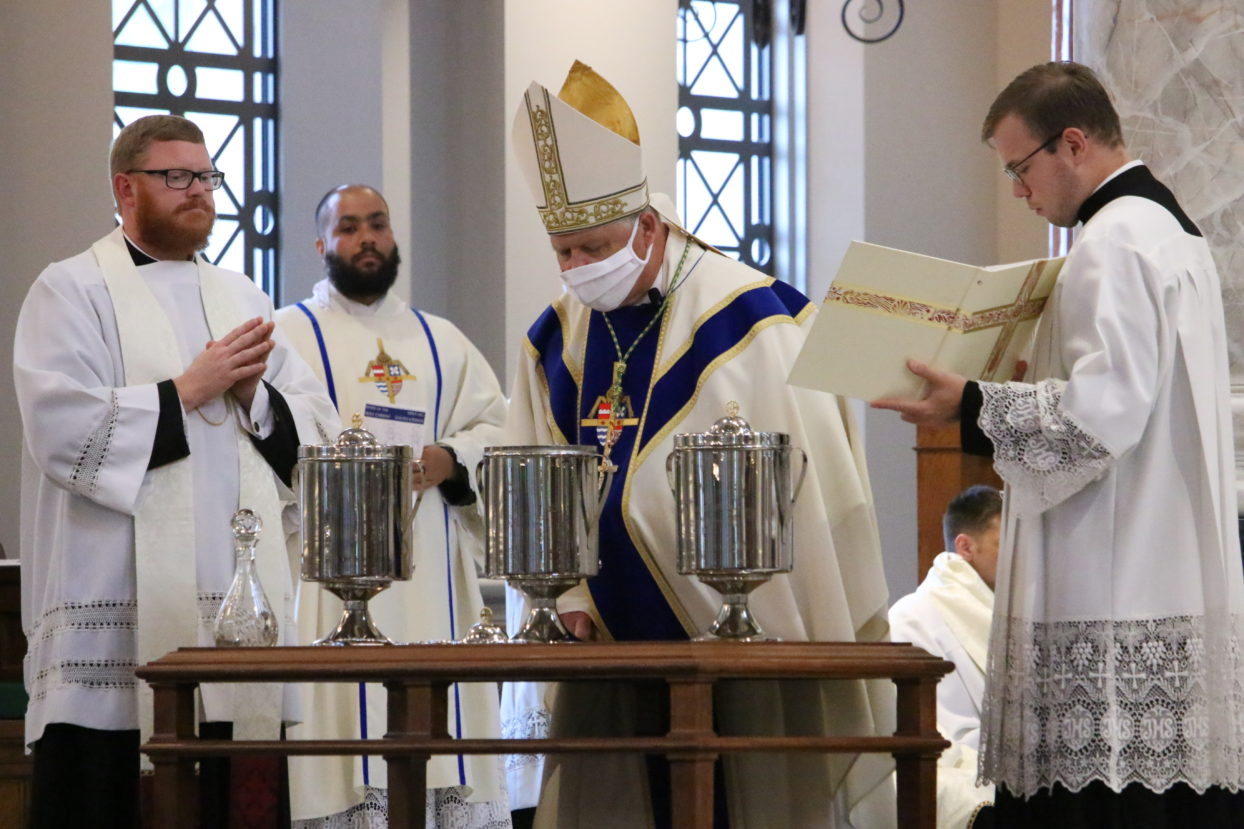Bishop Stika presides at annual Eastertide service, with only priests, deacons, women religious celebrating
By Bill Brewer
It was a Chrism Mass unlike any other celebrated in the Diocese of Knoxville.
Bishop Richard F. Stika presided at the annual Mass, which had to be rescheduled from its original day and time on April 7 at 7 p.m. to May 19 at 11 a.m. in adherence to guidelines for churches to restrict attendance because of the coronavirus pandemic.
In observance of COVID-19 protocols, the Chrism Mass was celebrated privately, with only diocesan priests, deacons, women religious, and altar servers attending instead of the Cathedral of the Most Sacred Heart of Jesus teeming with Catholics from every corner of the diocese.
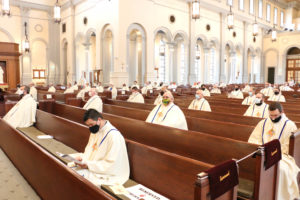
Many of the Diocese of Knoxville’s priests and deacons attended the Chrism Mass on May 19 in the Cathedral of the Most Sacred Heart of Jesus. The Mass was limited to only priests, deacons, and women religious due to COVID-19 guidelines, which included sitting at safe distances from others and wearing masks.
While the absence of those East Tennessee Catholics was apparent, this year’s Chrism Mass was uniquely striking in its intimacy as Bishop Stika addressed his masked concelebrants personally, thanking them for carrying out their ministry at such an uncertain and unsettling time.
Principal concelebrants at the Chrism Mass were Cardinal Justin Rigali, Father David Boettner, rector of the cathedral and a diocesan vicar general, and Father Doug Owens, pastor of All Saints Parish in Knoxville and also a vicar general. Masters of ceremonies were Father David Carter, rector of the Basilica of Sts. Peter and Paul in Chattanooga, and Father Arthur Torres, associate pastor of the Cathedral of the Most Sacred Heart of Jesus.
Some 50 priests concelebrated the Mass, with more than a dozen deacons and nearly a half-dozen women religious also in attendance.
Seminarian Zach Griffith, who is in the transitional diaconate, served as deacon of the Word, and seminarian Alex Hernandez, who also is in the transitional diaconate, served as deacon of the Eucharist. Deacons Griffith and Hernandez are to be ordained into the priesthood in late summer.
In his homily to his brother priests, Bishop Stika reminded them that the priesthood is a ministry that closely serves fellow Catholics and is not simply a profession, as evidenced by the COVID-19 quarantine, when diocesan priests took extraordinary measures to minister to their parishioners.
“Are we defined, as brother priests and maybe future priests, by the activities that we perform? The baptisms, the office hours, the confessions. . . . If we believe we are defined by that, then we, at one moment in our life when we said ‘present,’ then we are walking into a profession. I really do think that in these last two months, every part of the world in which we live hopefully has presented to us who we are as priests,” Bishop Stika said.
“Because it’s not just about the activity, the meetings and the various activities we are involved in in terms of our ministerial obligations. We’ve received the beautiful, tremendous gift of the priesthood that we do not demand or deserve in some ways. To think, we began an incredible journey of developing more and more into the person of Jesus Christ, not defined by our activities, but to be defined by the very essence of ourselves and our relationship in Jesus,” the bishop added.
Bishop Stika addressed the priests, deacons, and women religious from a seated position in front of the altar. He explained to them that he had surgery the previous day to repair damage to his left shoulder that occurred through the years.
They were sitting in every other pew, several feet apart as coronavirus guidelines dictated for Mass participation in the cathedral nave. Their faces were covered by COVID-19-preventing masks.
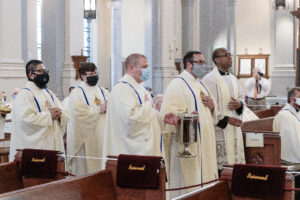
Priests bring the oils that will be used for the sacred chrism, the oil of catechumens, and the oil of the sick to the sanctuary, where Bishop Stika blesses them and consecrates the chrism.
Bishop Stika cited Monsignor George Schmidt, former rector of the Basilica of Sts. Peter and Paul, who died in 2016, and Monsignor Bob Hofstetter, pastor of Good Shepherd Church in Newport, for their dedication to the priesthood as they served years after they could have retired. Next year will mark the 60th year Monsignor Hofstetter has served as a priest.
“Of all the guys who have been around a while, of all the changes in the Church, and in society, especially if you were ordained before the (Second Vatican) Council, and all the various moments of the world: Vietnam, 9/11, personal tragedy like the loss of a parent, friend, or loved one . . . Whether it was in a public sense or whether it was contained in the depths of our hearts, they all are part of our priesthood. I think all of those moments generally build up a priesthood that has been given to us.
“There’s no way we can look at the philosophical, theological, ontological changes, but at some moment in our lives we responded ‘yes’ to that invitation that is filled with mystery. Do you remember that in your own life when all of a sudden you made that first step? Or maybe it was a push from a parent, or a priest, or a nun. Maybe you recognize in your life that you had all the ingredients; you had all the characteristics; you had that sense of a priestly presence. . . . The journey of priesthood. The gift of priesthood. The experience of priesthood,” Bishop Stika said.
Just before Bishop Stika blessed the sacred chrism, the oil of catechumens, and the oil of the sick, he asked his fellow priests to renew their commitment to priestly service.
In a prelude to this rite, the bishop said he hoped the priests used the two months of coronavirus isolation to pray about their vocation.
“These last two months, I pray, have invited you to take that time to reflect, and to pray, and to recommit to the priesthood of Jesus Christ. So often I remind us that sometimes we have to think outside the box. And you’ve done incredible jobs these last months. But I’m sure throughout your priesthood you’ve done that as well . . . to think outside the box on how you can reach a person in the depths of their hearts when they were hurting, when they were lost, when they were searching. The gift of Jesus to all of us, the gift that we can recognize that indeed spiritual reward is upon us,” Bishop Stika said.
“I’ve said this time and time and time again, the presbyterate of the Diocese of Knoxville is greatly blessed because we come from different places. True missionaries: converts, lifers, second-career people, from different parts of the world and cultures that influence all of us and give us a true sense of what it means to be part of the universal Church. What a blessing. I hope you believe this,” he added.
“We may not always like each other. But you don’t have to like someone to love them. And we share an incredible experience of the vocation as a priest and as a deacon united by Jesus.”
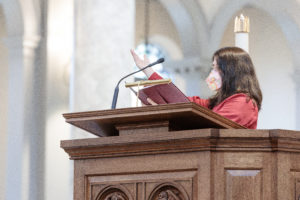
Sacred Heart Cathedral cantor Michelle Pokelwaldt leads the responsorial at the Chrism Mass while wearing personal protective equipment.
Bishop Stika gave homage to St. John Paul II, whose 100th birthday would have been May 18, and the bishop cited remarks by the Holy Father, who said before his death in 2005 that the title most important to him was “Father.”
“I pray for all of you as you continue to treasure that, the incredible experience of what it means to have people seek you out to assist them in their journey of faith, sometimes at the beginning of their journey, and other times at the end of their life. They see in you the presence of Jesus,” the bishop told his fellow priests.
In recognizing the priests, Bishop Stika called Father Marcin Gladysz to the altar, where he was formally incardinated into the Diocese of Knoxville, meaning he is now officially a priest of the Diocese of Knoxville after transferring from the Archdiocese of Czestochowa.
Bishop Stika singled out Father Gladysz, who prefers to be called Father Martin, as a missionary priest who served God faithfully in foreign destinations before he started ministering in the Diocese of Knoxville in January 2018. Father Gladysz’s hometown is Czestochowa, Poland, and he has served as a priest in Papua New Guinea, and Chicago.
“We have a true missionary in our presence: Father Martin,” Bishop Stika said about the diocese’s newest priest, who now leads a ministry to Polish residents in Knoxville and also serves as a chaplain with the Knoxville Police Department. “We welcome him with open arms, for he truly represents, with his own life, from Czestochowa to Papua New Guinea; to Chicago; to Knoxville, that missionary spirit of the early Church.”
Bishop Stika also welcomed Father Jhon Mario Garcia, CM, to the Diocese of Knoxville. Father Garcia is a Vincentian Order priest from the Archdiocese of Los Angeles who will be serving in East Tennessee.
The bishop acknowledged the challenge the priests face as the faithful come to them seeking stability at an unsettling time. Public Masses in the Diocese of Knoxville were suspended March 20 because of the coronavirus pandemic.
Father Carter has informally labeled the two-month shutdown period as “coronatide,” a play on words with the Eastertide period from Easter to Pentecost.
The bishop lifted the suspension the week of May 25 for daily Masses, and diocesan churches received parishioners for Pentecost vigil Masses and Pentecost Sunday Masses, May 30-31, for the first time in more than two months.
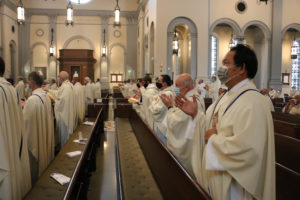
Diocese of Knoxville priests take part in the Chrism Mass at Sacred Heart Cathedral on May 19. During the Mass, Bishop Stika led the priests in renewing their commitment to priestly service.
“What will it be like in a month, or two months, or tomorrow? You need a firm foundation with Jesus. It’s a reminder to all of us that when you return to the Father, with the promise of the paraclete, you still have the presence of the Holy Spirit,” Bishop Stika said.
Following the pandemic-impacted Chrism Mass, Bishop Stika, with his left arm immobilized, observed that Chrism Masses he’s celebrated in recent years have tended to be challenging.
“Our Chrism Masses have been interesting. I celebrated one just a few days after I got out of the hospital and everyone thought I was going to keel over. Another year, everyone around me had on bullet-proof vests because I had a death threat against me. So this one was unusual, but churches always adapt,” the bishop said.
In 2015, a diabetic complication left him gravely ill, but he rallied in time to celebrate the Chrism Mass in the original Sacred Heart Cathedral, delivering the homily while leaning on his crozier. Also during a Chrism Mass in the original cathedral, incense during the Mass set off a smoke alarm, prompting an emergency visit from the Knoxville Fire Department.
Following the 2020 Chrism Mass, Bishop Stika said he was looking forward to the return of public Masses and the diocese returning to some sense of normalcy. And he’s grateful for the priests, deacons, and women religious who have faithfully continued their ministries during a historically unsettling time.
“It was good to see all the guys, my brother priests. It was good to welcome Father Martin (Gladysz) into our diocese. And Father Jhon Mario is going to join us. It’s just a great joy,” Bishop Stika said. “I love the commitment that our priests, and our seminarians, and our deacons have.”
Bishop Stika also is grateful for parishioners throughout the diocese who continued to support the Catholic Church in spiritual Communion while public Masses were suspended.
“I’ve come to the mindset that even when people aren’t present in the church building, they are present in this universal Church,” he said.

